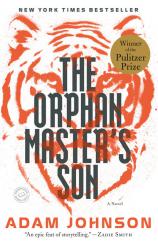The Orphan Master's Son
Review
The Orphan Master's Son
When North Korean leader Kim Jong Il died recently, spectators in the West largely failed to comprehend the public outpouring of what appeared to be genuine, heartrending grief at his death. How, Americans asked, could such a profoundly oppressed people mourn the man responsible for it, with such sincerity and intensity? Anyone who found their response hard to understand should, by all means, read Adam Johnson's new novel, THE ORPHAN MASTER'S SON.
"At times, fiction, despite being a form of lying, illuminates the truth better than any so-called factual report. Nowhere is that more true than in THE ORPHAN MASTER'S SON."
Westerners largely lack even the most basic understanding of North Korea, in particular how its ordinary people live their lives. North Korea is in the news from time to time, to be sure, when its military fires off a missile or makes threats against neighboring countries like Japan. But the lives of the ordinary citizens, those whose existence and culture are so isolated as to be unimaginable to much of the world, are also practically invisible.
In THE ORPHAN MASTER'S SON, Johnson offers a rare glimpse behind this façade, into the extraordinary life of one man, Pak Jun Do. Raised as the only non-orphan in an orphanage, subject to the same social ostracism as the orphans he encounters, Jun Do embarks on a life of remarkable fluidity, inventiveness and adventure, even as he struggles to comprehend his own place in society and in the larger world.
As a young man, Jun Do is recruited as an unwilling kidnapper, paying his dues in an uncomfortable assignment in order to obtain a steadier (and less morally fraught) position as an English-language interpreter and spy. Assigned to a fishing boat patrolling the seas off North Korea, Jun Do monitors radio signals for intercepted enemy communications and has his first encounter with Americans. Following the defection of one of his fellow travelers, Jun Do discovers that a story --- even a preposterous one --- told often and with conviction can become, in its way, the truth. Thus, Jun Do embarks on a most unlikely career of falsehood and reinvention, offering him access to the West as well as to Korea's most celebrated actress and to the Dear Leader himself.
Along the way, Adam Johnson --- who spent many years researching the book --- shows readers glimpses of the lives of everyday North Koreans, many of whom are branded as enemies of the state for violations that might seem minor to outsiders. He also demonstrates, often in heartbreaking ways, the extent to which the North Korean propaganda machine has infiltrated every thought and action of its people. At one point, asked by an American woman if he feels free, Jun Do replies, "When you're in my country…everything makes simple, clear sense. It's the most straightforward place on earth." As he witnesses more of his country's brutalities over time, however, Jun Do might discover that, despite the clarity and straightforwardness of its own narrative, the story of North Korea might not be so simple after all.
Satire is a difficult genre, but Adam Johnson handles his material adroitly. Simultaneously deadly serious and very funny, the book shows readers a complex portrait of North Korea that will surprise almost everyone, even those who think they know the North Korea they see in the news. At times, fiction, despite being a form of lying, illuminates the truth better than any so-called factual report. Nowhere is that more true than in THE ORPHAN MASTER'S SON.
Reviewed by Norah Piehl on January 12, 2012





